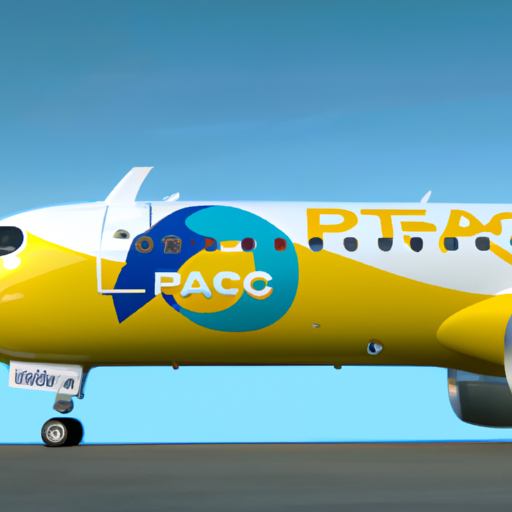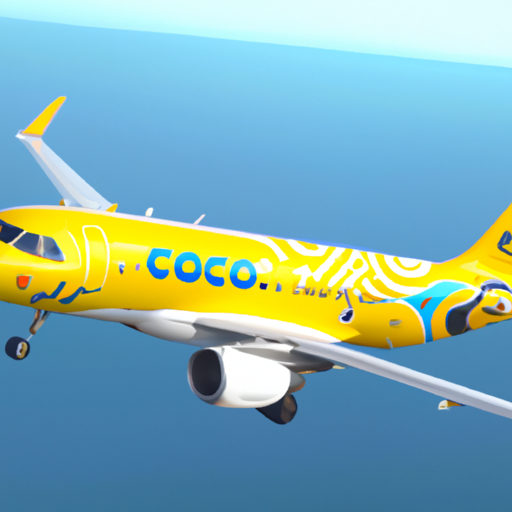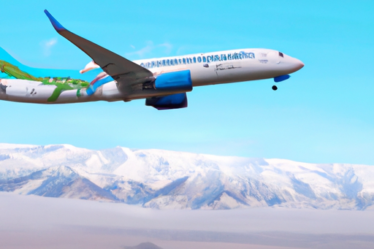
Expansion and Growth: Cebu Pacific’s 8th New Aircraft in 2021
Cebu Pacific, one of the leading low-cost carriers in the Philippines, is continuing its expansion and growth with the recent addition of its 8th new aircraft in 2021. This milestone marks another step forward for the airline as it strives to provide more options and better services to its passengers.
The new aircraft, an Airbus A320neo, is a state-of-the-art plane that offers enhanced fuel efficiency and reduced carbon emissions. This aligns with Cebu Pacific’s commitment to sustainability and its efforts to minimize its environmental impact. With this new addition to its fleet, the airline can further optimize its operations and contribute to a greener aviation industry.
The Airbus A320neo is also known for its spacious cabin and modern amenities, ensuring a comfortable and enjoyable flying experience for passengers. With a seating capacity of up to 194 passengers, the aircraft provides ample space for travelers to relax and unwind during their journey. Additionally, the plane is equipped with the latest technology, including in-flight entertainment systems and USB charging ports, allowing passengers to stay connected and entertained throughout their flight.
Cebu Pacific’s continuous investment in new aircraft reflects its commitment to providing reliable and efficient services to its customers. By expanding its fleet, the airline can increase its flight frequencies and offer more destinations to its passengers. This not only enhances connectivity within the Philippines but also strengthens Cebu Pacific’s position as a key player in the regional aviation industry.
Furthermore, the addition of the 8th new aircraft in 2021 demonstrates Cebu Pacific’s resilience and determination to bounce back from the challenges posed by the COVID-19 pandemic. Despite the unprecedented disruptions faced by the aviation industry, the airline remains steadfast in its pursuit of growth and recovery. The new aircraft symbolizes a renewed sense of optimism and confidence in the future of air travel.
As Cebu Pacific expands its fleet, it also creates more job opportunities for pilots, cabin crew, and ground staff. The airline’s growth translates into economic benefits for the communities it serves, contributing to job creation and economic development. This is particularly crucial in the current global climate, where many industries are struggling to recover from the impact of the pandemic.
Looking ahead, Cebu Pacific has ambitious plans for further expansion and growth. The airline aims to increase its fleet size and add more routes to its network, both domestically and internationally. By continuously investing in new aircraft, Cebu Pacific can meet the growing demand for air travel and provide affordable and accessible options for travelers.
In conclusion, Cebu Pacific’s acquisition of its 8th new aircraft in 2021 is a testament to its commitment to expansion and growth. The addition of the Airbus A320neo not only enhances the airline’s operational efficiency but also improves the passenger experience. As Cebu Pacific continues to invest in its fleet, it strengthens its position as a leading low-cost carrier in the Philippines and contributes to the growth of the aviation industry. With its sights set on the future, Cebu Pacific remains dedicated to providing affordable and reliable air travel options for its customers.
Enhancing Passenger Experience: Cebu Pacific’s Latest Fleet Addition

Cebu Pacific, the leading low-cost carrier in the Philippines, has recently received its 8th new aircraft in 2021. This latest addition to their fleet is part of the airline’s ongoing efforts to enhance the passenger experience and provide even better service to its customers.
The new aircraft is an Airbus A321neo, a state-of-the-art narrow-body aircraft known for its fuel efficiency and passenger comfort. With a seating capacity of up to 240 passengers, the A321neo allows Cebu Pacific to accommodate more travelers on its domestic and international routes.
One of the key features of the A321neo is its spacious cabin, which provides ample legroom and overhead storage space for passengers. This means that travelers can enjoy a more comfortable journey, whether they are flying for business or leisure. Additionally, the aircraft is equipped with the latest in-flight entertainment systems, allowing passengers to stay entertained throughout their flight.
In terms of fuel efficiency, the A321neo is a game-changer. It is equipped with advanced engines that consume less fuel compared to older aircraft models. This not only helps reduce operating costs for the airline but also contributes to a greener and more sustainable aviation industry.
Cebu Pacific is committed to providing affordable air travel options to its customers, and the addition of the A321neo to its fleet is a testament to this commitment. The airline is able to offer competitive fares while still maintaining high standards of safety and service. With the new aircraft, Cebu Pacific can continue to offer affordable fares to more destinations, making travel more accessible to a wider range of passengers.
Furthermore, the A321neo is equipped with the latest technology and safety features, ensuring a smooth and secure journey for passengers. From advanced avionics systems to enhanced emergency evacuation procedures, Cebu Pacific prioritizes the safety and well-being of its passengers above all else.
The arrival of the 8th new aircraft in 2021 is a significant milestone for Cebu Pacific. It reflects the airline’s commitment to continuous improvement and innovation in order to provide the best possible travel experience for its customers. With a modern and efficient fleet, Cebu Pacific is well-positioned to meet the growing demand for air travel in the Philippines and beyond.
In conclusion, Cebu Pacific’s latest fleet addition, the Airbus A321neo, is a testament to the airline’s dedication to enhancing the passenger experience. With its spacious cabin, advanced in-flight entertainment systems, and fuel efficiency, the A321neo allows Cebu Pacific to offer a more comfortable and sustainable travel option to its customers. As the airline continues to expand its fleet, it remains committed to providing affordable fares, top-notch safety measures, and excellent service to travelers. With Cebu Pacific, flying has never been more enjoyable and accessible.
Sustainable Aviation: Cebu Pacific’s Commitment to Modernizing its Fleet
Cebu Pacific, the leading low-cost carrier in the Philippines, has recently received its 8th new aircraft in 2021. This milestone is a testament to the airline’s commitment to modernizing its fleet and embracing sustainable aviation practices.
With the aviation industry facing increasing pressure to reduce its carbon footprint, Cebu Pacific has taken proactive steps to ensure that its operations are as environmentally friendly as possible. The airline has made significant investments in new, fuel-efficient aircraft that not only reduce emissions but also offer a more comfortable and enjoyable flying experience for passengers.
One of the key highlights of Cebu Pacific’s sustainable aviation efforts is its investment in the Airbus A321neo. This state-of-the-art aircraft is equipped with the latest technology, including more efficient engines and aerodynamic improvements, which significantly reduce fuel consumption and emissions. In fact, the A321neo consumes 15% less fuel compared to previous generation aircraft, making it one of the most fuel-efficient planes in the industry.
In addition to the A321neo, Cebu Pacific has also added other modern aircraft to its fleet, such as the ATR 72-600 and the Airbus A320neo. These aircraft are designed to be more fuel-efficient and emit fewer greenhouse gases, contributing to the airline’s overall sustainability goals.
Cebu Pacific’s commitment to sustainable aviation extends beyond its fleet modernization efforts. The airline has implemented various initiatives to reduce waste and promote recycling. For example, it has introduced a paperless ticketing system, encouraging passengers to use electronic boarding passes instead of printed ones. This not only saves paper but also reduces the airline’s carbon footprint by minimizing the need for transportation and disposal of paper tickets.
Furthermore, Cebu Pacific has partnered with local communities and organizations to support environmental conservation projects. The airline actively participates in tree-planting activities and collaborates with non-profit organizations to raise awareness about the importance of preserving natural resources.
By embracing sustainable aviation practices, Cebu Pacific is not only reducing its environmental impact but also setting an example for other airlines in the region. The airline recognizes that sustainability is not just a buzzword but a responsibility that it must uphold to ensure a better future for the aviation industry and the planet as a whole.
Passengers flying with Cebu Pacific can take pride in knowing that they are supporting an airline that prioritizes sustainability. By choosing to fly with Cebu Pacific, they are contributing to the reduction of carbon emissions and the preservation of the environment.
In conclusion, Cebu Pacific’s recent acquisition of its 8th new aircraft in 2021 is a testament to its commitment to modernizing its fleet and embracing sustainable aviation practices. Through investments in fuel-efficient aircraft, waste reduction initiatives, and partnerships with environmental organizations, the airline is leading the way in promoting sustainable aviation in the Philippines. Passengers can feel confident that their choice to fly with Cebu Pacific aligns with their own commitment to a greener future.


